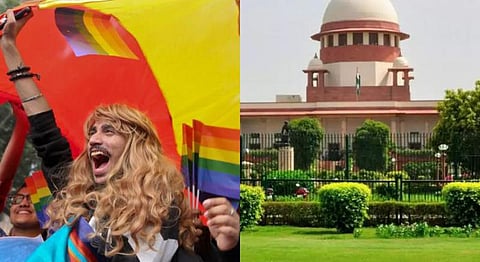
- HOMEGROWN WORLD
- #HGCREATORS
- #HGEXPLORE
- #HGVOICES
- #HGSHOP
- CAREERS
- ABOUT US
- CONTACT US

Three days ago on August 29, during a hearing of the apex Supreme court, Justices DY Chandrachud and AS Bopanna expanded the definition of family, noting that “Familial relationships may take the form of domestic, unmarried partnerships or queer relationships” while maintaining that an ‘atypical’ manifestation of a family unit is as real as its traditional counterpart and deserves protection under the law, as per PTI.
The verdict came as a result of a hearing in defence of a non-biological mother availing her maternity leave to take care of a non-biological child. The ruling defined a household broadly to include single parents, stepparents, and adoptive families.
This verdict carries a significance that activists have been fighting for since the decriminalisation of homosexuality in 2018 in terms of the recognition of LGBTQAI+ civil unions and marriages as well as allowing live-in couples to adopt. So while the definition of ‘family’ earlier was static, it is clear that the apex court has a different opinion.
Unfortunately, this is simply a statement made by them and not a law that has been ratified. The hand of the law is slow and long-drawn and the statement is unlikely to be made into law anytime soon. Even with the 2018 verdict on Section 377, we are yet to see a large-scale change in the mindset of society as a whole. After almost four years of the verdict, we still see homophobic, caste, and class-based violence and injustice against LGBTQAI+ individuals.
Currently, the situation for unmarried live-in couples bodes well. They are allowed to adopt children as of 2018 and women in live-in ‘domestic relationships’ are protected under the Protection of Women from Domestic Violence Act, 2005 (DV Act). However, the only type of live-in relationship that is recognised is one between two unmarried individuals. The court has mentioned ‘individuals’ rather than ‘man and woman’, leaving room for interpretation for queer couples. The recent ruling also mentioned that the law cannot be used as an excuse to “...disadvantage families which are different from traditional ones,” decreeing that queer couples and other non-traditional families are entitled to any social benefits given to a traditional family.
This verdict and the statements from the apex court have pushed the fight for LGBTQAI+ rights a little further and will hopefully be tremendously helpful in the fight towards ridding our constitution of the regressive colonial-era laws that attack the identity of people outside the binary. A legal fight for same-sex marriage is currently making its way through our country’s lower court after the 2014 and 2018 wins for the LGBTQAI+ community.
Whether progress has been made in real life, however, still remains to be seen. Unmarried live-in couples face troubles ranging from being unable to stay in a hotel together to being unable to rent a house together let alone explore the possibility of raising a child together. For heterosexual couples at least, the future is in sight. For same-sex couples, there is still the matter of not only societal acceptance, but also physical, mental, and legal safety. The court stated, “These manifestations of love and families may not be typical but they are as real as their traditional counterparts.” We hope that the court is able to put its money where its mouth is and bring actual protection under the law to fruition along with providing benefits under social welfare legislation for unmarried live-in couples of all genders and sexualities.
If you enjoyed reading this, we also suggest:
